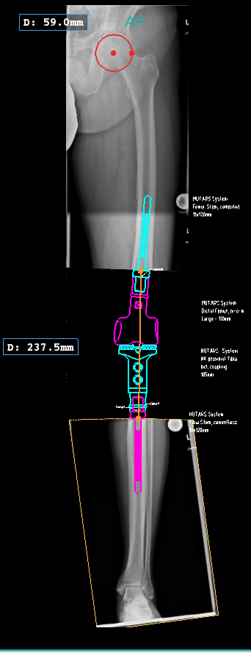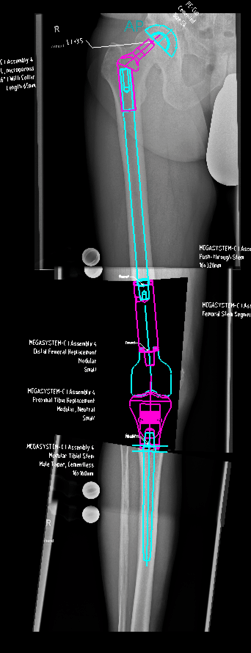PeekMed
Primary bone cancers - cancerous tumors that start in the bone - correspond to less than 1% of all types of cancer.
However, secondary bone cancer is a much more common type. In this case, cancer started elsewhere and made it to bone metastasis, once cancer spread.
Regardless of its origin and the treatment for bone cancer, orthopedic surgeons seek, above all, to ensure patient safety and quality of life after treatment.
As you know, orthopedic cancer leads to intervention and, consequently, limb salvage surgery and the need for reconstruction.
Bone reconstruction with a tumor prosthesis remains the primary treatment for reconstructing limbs affected by bone tumors. Reconstruction with bone cancer implants is advantageous for two reasons:
- It facilitates the stable function of the affected limb and early return to normal activities
- The surgical rate of patients treated with tumor prosthesis in prosthetic reconstruction is satisfactory, a study suggests
That said, when it comes to implants and bone tumor resection, modular prostheses are a standard solution.
Why choose a modular implant? Keep reading.
Prosthetic reconstruction is the most common approach in bone cancer prosthesis
This is mainly because of the ease of use when compared with other options and the difficulty of obtaining allografts in some centers, in addition to the reported risks of nonunion, fracture, and infection.

This approach to cancer and orthopedics treatment also includes relative availability, immediate stability, the possibility of rapid recovery, and early weight-bearing
On top of that, compared to regular implants, modular prostheses provide the ability to adjust the proper length at the time of the reconstruction.
As for the modular part, compared to regular and custom-made implants, modular prostheses allow surgeons to adjust the proper length at the time of the reconstruction.
An example of prosthesis implants is Implantcast’s MUTARS – which stands for Modular Universal Tumor And Revision System and LINK’s MEGA SYSTEM C.
Regardless of the procedure the surgeon wants to perform – should it be a proximal femur replacement, total knee or a proximal tibia – PeekMed integrated system supports the surgeon. This includes the preoperative planning of the surgery and providing all the insights and options necessary for the tumor treatment.
No system is proven to be ideal when it comes to restoring normal function and long-term solutions when addressing bone and soft tissue tumors.
H owever, studies have shown that MUTARS, produced by Implantcast GmbH, modular prostheses might be a good strategy when it comes to addressing tumor knee surgery after resection.
owever, studies have shown that MUTARS, produced by Implantcast GmbH, modular prostheses might be a good strategy when it comes to addressing tumor knee surgery after resection.
Where are we going on orthopedic bone cancer?
While promising, there have been some reports of issues when it comes to modular prosthetic implants.
These include the frequent need for revision surgery and infection rates between 6 and 20 percent.
Mechanical complications – aseptic loosening, periprosthetic fractures, and wear – have also been reported.
As medical research and technology grow and further develop, the surgery of patients with bone sarcomas has been improving.
Hence, it becomes even more necessary to improve implant design and reconstructive techniques to ensure the patient's quality of life.



